2021 SURF projects
Characterizing extreme streamflow under climate change in Hawai‘i
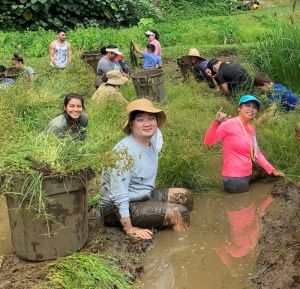
Faculty mentor: YinPhan Tsang, NREM, UH Mānoa
Little is known about how Hawaiian streamflow will be affected by projected shifts in rainfall (both drought and intense precipitation) due to climate change. John helped to characterize the relationship between streamflow and the shifting timing and intensity of rainfall, as well as the effects on native fish and fluvial ecosystems.
Assessing microplastic concentrations and their impacts on coral climate resilience in Kāneʻohe Bay
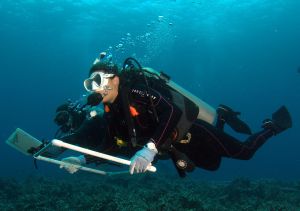
Faculty mentor: Chris Sabine, Oceanography, UH Mānoa
Impacts from multiple local stressors on corals can combine to reduce reef resilience to global stressors of ocean warming and acidification. Samantha explored the prevalence of different types of microplastics in Kāneʻohe Bay to identify any correlation of effects on local coral health in conjunction with temperature and chemistry changes.
Evaluating energy acquisition and demand of select Hawaiian herbivorous reef fish under warming marine conditions
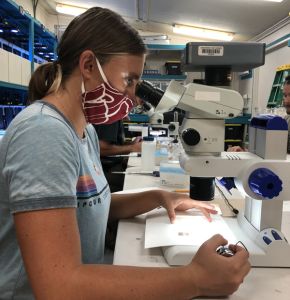
Faculty mentor: Jacob Johansen, HIMB, UH Mānoa
Herbivorous reef fishes are critical to the health of reef ecosystems, preventing algal overgrowth, but warming events that threaten reefs may also threaten these fishes. Pixie helped evaluate energy acquisition rates of Hawaiian herbivorous fishes in various temperature regimes to determine their resilience to rising ocean temperatures.
Experimental study of using perforated structures to reduce beach erosion
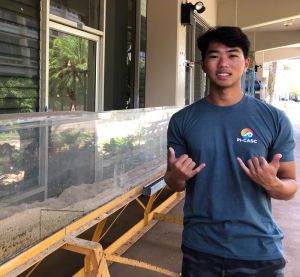
Faculty mentor: Zhenhua Huang, Ocean and Resources Engineering, UH Mānoa
With rising sea levels, beach erosion has increased dramatically across the Hawaiian Islands, threatening ecosystems and coastal infrastructure. Aaron performed flume experiments simulating winter and summer coastal conditions, with varying sea levels, to evaluate the effectiveness of model perforated structures on sand retention and beach stabilization.
Assessing effect of tidal variability in phytoplankton distribution in Heʻeia estuary through microscopy
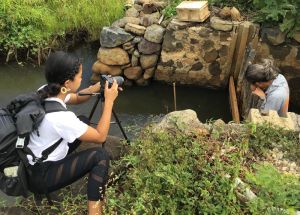
Faculty mentors: Shimi Rii and Fred Reppun, HIMB, UH Mānoa and Heʻeia NERR
Considerable research is being conducted to learn how best to make restored Hawaiian fishponds productive aquaculture sites again and promote local food security. Ciara helped to identify and quantify the phytoplankton species in the Heʻeia fishpond, that provide food for the mullet being raised, to characterize the phytoplankton community in the pond and its fluctuations through a typical tidal cycle.
The fate of anthropogenic pollutants in the Ahuimanu-Kahaluʻu stream system considering future climate conditions
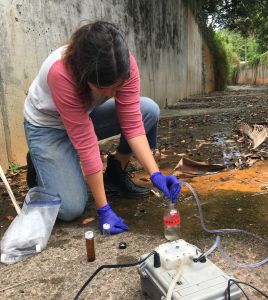
Faculty mentor: Henrietta Dulai, Earth Sciences, UH Mānoa
With future climate conditions of wetter storms and higher sea levels, more prevalent flooding conditions may mean that more pollutants, like pharmaceuticals and pesticides, introduced into streams will reach the coastal waters. Sofia investigated the relationship between streamflow levels, from varying rainfall conditions, and pollutant concentrations, to estimate contaminant input levels and removal trends from natural bioremediation in streams with natural versus cemented beds.
PROGRAM DETAILS
These six projects were conducted during the 10 weeks of the PI-CASC Summer Undergraduate Research Fellowship program in 2021. The SURFers worked with their mentors to carry out these impressive climate adaptation science projects, participated in professional development workshops, and presented their results at a symposium at the end of the summer.

